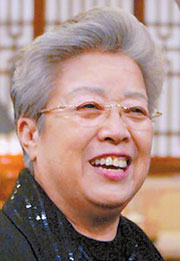She is known as "China's iron lady," but impresses
the world with her soft tone and charming smiles.

Wu Yi [CD/file] |
She
dreamed of becoming a great entrepreneur in her youth, but turned into the only
female figure in China's core of political power.
Elegant and intelligent, Vice-Premier Wu Yi, 67, is the world's third most
powerful woman, according to a Forbes magazine list published on Friday. It also
said German Chancellor Angela Merkel overtook US Secretary of State Condoleezza
Rice as the world's most powerful woman, with Rice ranking second.
But Wu is not the only influential Chinese woman to feature on the list. She
is joined by Wu Xiaoling, 59, vice-governor of the People's Bank of China, and
Yang Mianmian, 65, chairwoman and executive director at the Haier Group, the
world's fourth-largest manufacturer of household appliances. They respectively
rank 35th and 70th on the list of the world's 100 most powerful women.
China's resource-starved and fast-paced economy has kept Vice-Premier Wu busy
this year, the US-based magazine said.
"Among the issues on her very full plate are addressing intellectual
copyright concerns and trade imbalances while nurturing new markets," it said.
She placated the European Union when she declared that "bilateral trade
co-operation is in the common interests of both sides."
She announced more than US$18 billion worth of government contracts,
including an estimated US$5 billion order for Boeing aircraft, while visiting
the United States in April.
She also travelled to the Democratic People's Republic of Korea on an
official goodwill visit, part of international efforts to tackle the DPRK
nuclear issue.
"In my eyes, Wu is a wise and capable woman, and a little bit aggressive. Her
benevolent smiles always give others a sense of security," said Chen Ruya, who
works for a foreign consultancy company in Beijing.
Her outstanding performances in China's diplomatic activities guaranteed her
place on the list, Chen said.
Wu helped hammer out five trade agreements with Russia in 1999 and oversaw
delicate negotiations for China's accession to the World Trade Organization.
Wu ranked second in 2004 and 2005 on the Forbes' list. Its annual listing is
based on a power ranking that is a composite of visibility measured by media
citations and economic impact.
Besides Wu, Merkel and Rice, the rest of the top 10 are business executives,
led by the chief executive-designate of PepsiCo, Indian-born and educated Indra
Nooyi.
In its assessment of Wu Xiaoling, Forbes said "no other woman is more
powerful in the world of finance in China than Wu Xiaoling."
She won kudos for restoring confidence in China's economy and its currency
after she helped calm the markets during the Asian financial crisis in 1997-98.
Since last year, Wu has been overseeing the country's interest rate increases
and the reform of the foreign exchange regime, as the United States urges China
to make its currency more flexible.
Yang Mianmian is one of China's most powerful businesswomen. She became
chairwoman and an executive director of Haier in January last year. "Our
long-term goal is to become a global top three white goods manufacturer," Yang
wrote in an April letter to shareholders.